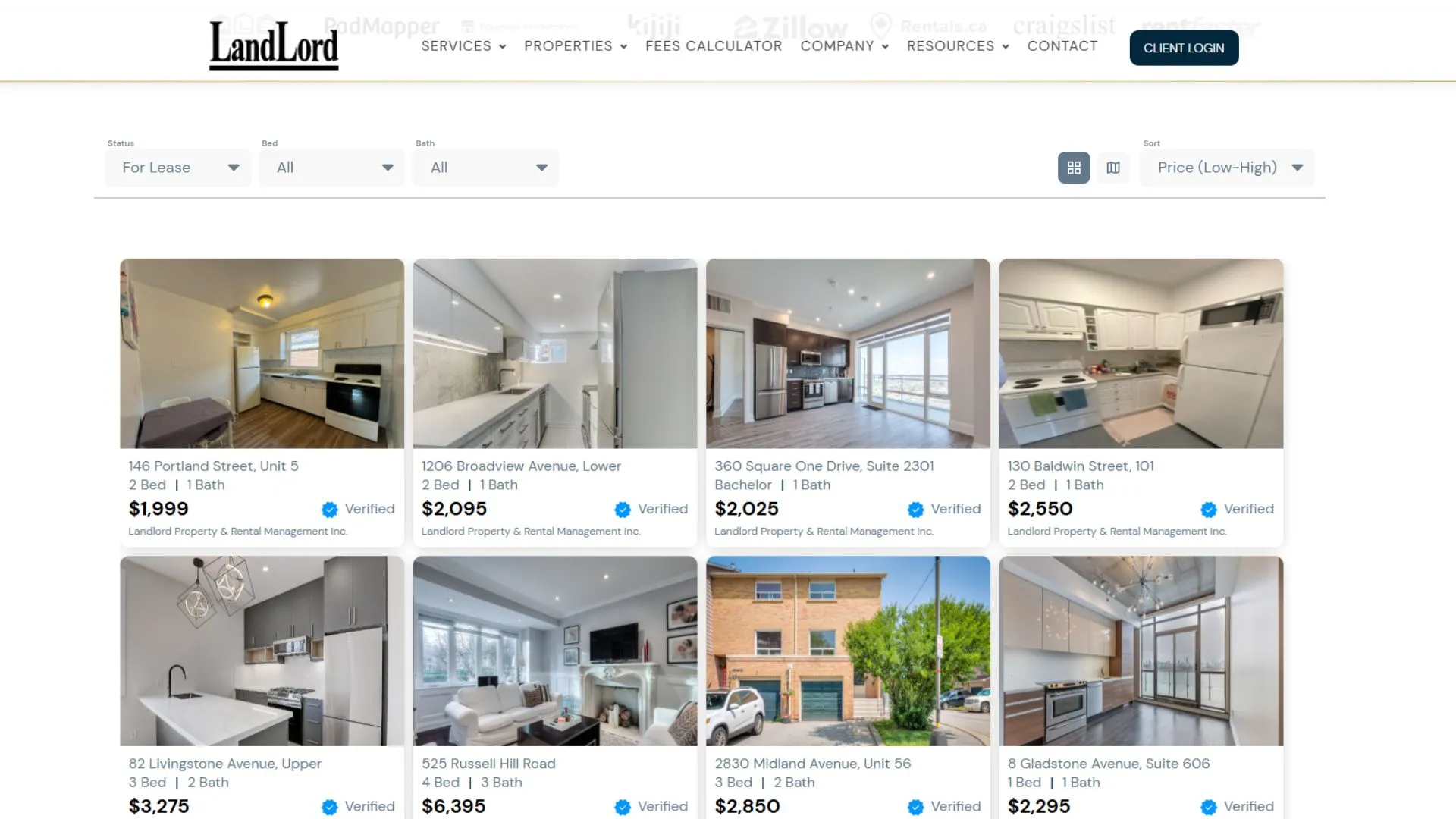Are you looking to rent a property in Toronto? Whether you’re new to the city or unfamiliar with the local rental market, understanding your rights, responsibilities, and the rental process is crucial for a smooth and stress-free experience.
This guide will walk you through key steps, including searching for properties, securing a lease, avoiding scams, and navigating maintenance and renovation responsibilities, all to ensure you rent with confidence in Toronto.
Exploring Toronto Rentals: What Should You Know About Renting in Toronto?
Toronto’s rental market is one of the most competitive in Canada, with a high demand for both short-term and long-term rentals. Renters can expect to face rising rental prices, particularly in popular neighborhoods like downtown Toronto, the Annex, and the Waterfront. This competitive environment often means that properties are rented out quickly, sometimes before they are officially listed.
How Do You Search for Rental Properties in Toronto?
Finding the right property is the first step in your rental journey. Toronto’s competitive rental market requires careful navigation, so it’s essential to use reliable platforms to ensure your search is effective and secure. Start your search on these trusted sites:
- Realtor.ca: Managed by the Canadian Real Estate Association, it offers verified listings from licensed realtors, ensuring the legitimacy of properties. This site provides access to high-quality, well-documented listings, making it a trusted choice for prospective tenants.
- Landlord.net: Featuring listings from professional property managers, this platform ensures that properties are legitimate and managed by experts. You’ll have access to detailed and reliable rental options, reducing the risk of encountering unreliable listings.

Avoiding Rental Scams in Toronto
While major platforms like Realtor.ca and Landlord.net are secure, some tenants turn to general websites like Kijiji or Craigslist to find Toronto rentals. Unfortunately, these sites can sometimes host fraudulent listings. To protect yourself from rental scams, follow these crucial tips:
- Inspect Properties in Person: Always visit the property before committing. Never send money or sign a lease without inspecting the unit and verifying its condition firsthand. Photos can be misleading, and it’s important to see the property in person to ensure it matches the description.
- Avoid Paying in Cash: To protect yourself from fraud, always use traceable payment methods for deposits and fees. Opt for bank transfers or cheques rather than paying in cash. This creates a paper trail that can help protect you in case something goes wrong.
By staying cautious and following these guidelines, you can reduce the risk of falling victim to scams while searching for rental properties in Toronto.
You Might Also Like: Condo vs. Apartment Rentals: Which One is Right for You?
Step-by-Step Guide to Securing a Lease
What is Leasing?
Leasing refers to renting a property through a formal agreement between the landlord and tenant. This lease outlines key terms, such as the rent amount, duration of the lease, and rules governing the property’s use. Understanding these details is vital before you sign the lease to ensure you are fully aware of your obligations.
How to Secure a Lease?
Securing a lease involves finalizing the rental process by obtaining the landlord’s approval. To do so, you will need to provide required documentation, undergo a background check, and sign the lease agreement. After these steps are completed, the property is officially yours to occupy.
What Are the Documents Required to Secure a Lease in Toronto?
To secure a lease, gather the following documents in advance:
- Government-issued ID
- Proof of income or other supporting documentation
- Guarantor information (if you lack a strong credit history)
- Housing/rental history (including your current landlord’s name and contact info)
- Employer’s or supervisor’s name and contact info
Understanding Tenant vs. Landlord Maintenance Responsibilities
“Who Is Responsible for Maintenance in Toronto Rental Properties?” is a question we get all the time from our tenants. Knowing who is responsible for what when it comes to maintenance can help ensure a hassle-free living experience. Here’s a breakdown of each party’s responsibilities:
Landlord’s Maintenance Responsibilities
Landlords are required by law to maintain rental properties in a habitable condition. This includes:
- Ensuring major appliances, plumbing, heating, and electrical systems are in good working order.
- Repairing or replacing any broken items due to normal wear and tear.
However, if the damage is caused by tenant negligence, the tenant may be responsible for the repair costs.
Tenant’s Responsibilities for Maintenance
As a rule of thumb, tenants should always refer to their lease agreement for specific maintenance responsibilities. The lease agreement will detail the precise duties of both the tenant and the landlord. While the tenant is generally responsible for minor maintenance and upkeep, the lease may contain additional or unique clauses that modify these standard responsibilities.
In general, while landlords cover major repairs, tenants are expected to handle minor upkeep, such as:
- Changing lightbulbs and replacing filters.
- Keeping the property clean and in good general condition.
- Notifying the landlord promptly about issues that could cause damage, like leaks or electrical problems.
When to Request Maintenance
It’s essential to report maintenance issues as soon as they arise. For emergencies, such as loss of heat or water, landlords should respond immediately. For non-emergency issues, such as a broken appliance or a minor leak, landlords should address the problem in a reasonable time frame. Keep a record of all communications regarding maintenance requests to ensure prompt resolution.
Renovations in Rental Units: What Tenants Need to Know
Before making any changes to your rental unit, including cosmetic alterations like painting or installing shelves, always seek written permission from your landlord. While most landlords are open to cosmetic changes, they typically require tenants to restore the unit to its original condition when moving out. Unauthorized renovations can lead to disputes or the loss of your security deposit.
Conclusion: Renting with Confidence in Toronto
Renting a property in Toronto comes with its own set of challenges, but by understanding your rights and responsibilities, you can navigate the rental market with confidence. Here are a few key tips for a successful rental experience:
- Always ensure you have a written lease agreement.
- Understand your financial obligations before signing the lease.
- Communicate clearly and promptly with your landlord, especially regarding maintenance or renovation requests.
- Be cautious of scams by using trusted platforms and verifying listings in person.
By staying informed and proactive, you can make your rental experience in Toronto both smooth and enjoyable.
Q&A Section Renting Property in Toronto
1. What are some overlooked tips for finding the right rental in Toronto?
Finding the perfect rental in Toronto can be stressful, but there are a few often-overlooked strategies that can help:
- Look Beyond the Popular Neighbourhoods: While areas like Downtown and Queen West are popular, less trendy neighbourhoods may offer more competitive pricing and still be within a short commute to the city center.
- Ask About Additional Fees: Some landlords may charge additional fees for amenities like parking, storage, or utilities, so always clarify what’s included in the rent before committing.
2. How can I verify that a Toronto rental is being offered by a legitimate landlord?
Verifying a rental’s legitimacy is crucial, especially given the number of rental scams circulating in Toronto:
- Check for Online Listings on Reputable Sites: Use well-known, trusted platforms like Landlord.net, Realtor.ca, or established property management companies. If a listing only appears on social media or obscure platforms, be cautious.
- Research the Landlord or Property Manager: If possible, search for reviews or online mentions of the landlord or property management company. Positive reviews from previous tenants are a good sign.
- Request a Lease Agreement: A legitimate landlord will be willing to provide a lease agreement with clear terms. If they hesitate or only accept cash payments, it’s a red flag.
3. Is it possible to find a rental property in Toronto without a credit score?
While many landlords in Toronto require a credit score, there are still ways to secure a rental even without one:
- Provide Alternative References: If you don’t have a strong credit history, you can offer references from previous landlords, employers, or anyone who can vouch for your reliability and financial stability.
- Subletting Options: Consider subletting an apartment or renting from a private landlord who may be more flexible with credit requirements.
4. What are the common mistakes renters make when signing a lease in Toronto?
Renting in Toronto requires careful attention to detail. Here are some common mistakes renters should avoid:
- Not Reviewing the Lease Thoroughly: Many renters skim through leases, missing important clauses related to rent increases, maintenance responsibilities, or subletting policies. Always read the fine print.
- Assuming Rent Includes Everything: Some renters assume utilities like electricity, internet, and water are included in the rent, only to be surprised by additional monthly charges. Always clarify what’s included before signing.
- Not Inspecting the Property: It’s tempting to rush into a rental, especially in a competitive market, but always take the time to carefully inspect the unit for any damages or issues before signing the lease.
5. Can I negotiate the rental price if the unit is above my budget?
While negotiating rent in Toronto can be tricky, especially in a high-demand market, it’s not impossible. Here are some strategies:
- Show Strong Tenant Qualities: Highlight your reliability as a tenant, such as having a stable job, a good rental history, or offering a longer lease term.
- Move During the Off-Peak Season: Rent prices tend to be lower during the winter months when fewer people are moving. If you can time your search accordingly, you might have better luck negotiating.
6. How do I deal with rent increases in Toronto?
- Rent increases are common in Toronto, but there are rules in place to protect tenants:
Understand Your Rights: The Ontario Residential Tenancies Act limits how much a landlord can increase rent, typically once every 12 months, and the increase must follow the guideline set by the provincial government (w/ exceptions). - Negotiate for a Longer-Term Lease: If you’re worried about future rent hikes, locking in your rent rate through a longer-term lease can provide stability.
- Speak to Your Landlord: If an increase seems unreasonable, you can open a discussion with your landlord to see if there is room for negotiation, especially if the rent increase is higher than the legal guideline.
7. What steps can I take if I face issues with my landlord or apartment?
If you encounter issues with your rental, it’s essential to know your rights and responsibilities:
- Document Everything: Keep detailed records of any issues, including photos of damages, correspondence with the landlord, and repair requests. This can help if you need to escalate the issue.
- Try to Resolve It Directly: Often, landlords are willing to work with tenants to resolve disputes, especially if approached respectfully and professionally.
- Seek Mediation or Legal Advice: If the situation doesn’t improve, you may need to seek help through Ontario’s Landlord and Tenant Board, which can mediate disputes or provide legal advice.
8. How do I ensure that my rental experience in Toronto is positive?
Having a successful rental experience in Toronto relies on communication, preparation, and mutual respect:
- Maintain Open Communication: Keep the lines of communication open with your landlord. Report any issues promptly and be proactive about maintaining the property.
- Be a Good Neighbor: Respect other tenants and neighbors by following building rules and keeping noise levels down. A positive relationship with those around you can make your experience much more pleasant.
- Plan for the Future: Whether you’re planning to move out soon or stay long-term, having an idea of what you want from the rental property—such as whether it meets your needs for space, location, and amenities—will help you avoid problems later on.



